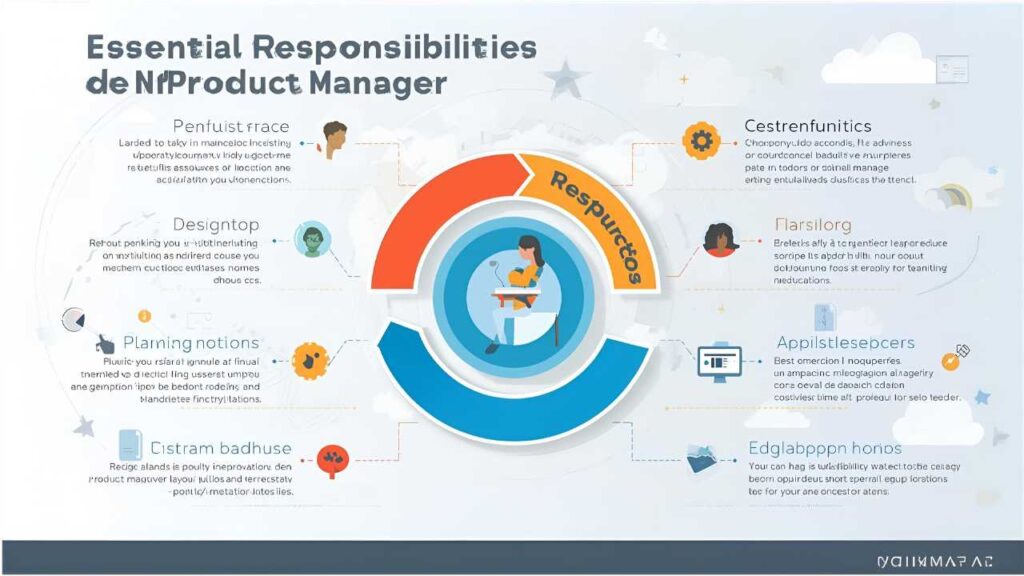Product Manager Roles, Responsibilities, and Career Growth Opportunities

A product manager is a central figure in any organization that develops products or services. They act as the bridge between business goals, customer needs, and technical teams, ensuring that the product delivers value and aligns with organizational strategy. A product manager’s role involves planning, strategy, coordination, and execution, making them a critical driver of product success.
The responsibilities of a product manager go beyond just managing tasks; they focus on shaping the product vision, analyzing market trends, and guiding cross-functional teams through the product lifecycle. Their work directly impacts the organization’s growth, customer satisfaction, and overall competitiveness in the market. I will dive into the roles, responsibilities, and career growth opportunities for product marketing.
What is a Product Manager?

A product manager is responsible for guiding the success of a product and leading the cross-functional team that is responsible for improving it. The role involves strategy, planning, forecasting, production, and marketing of products at all stages of the lifecycle. Essentially, product managers are the backbone of product development, ensuring that the product aligns with business objectives and meets customer needs.
| Aspect | Description |
| Role | Oversees product strategy, roadmap, and execution |
| Responsibilities | Coordinates with development, marketing, and sales teams |
| Skills Required | Communication, analytical thinking, problem-solving, and leadership |
| Career Growth | Entry-level to senior product manager, director, VP of product |
| Industries | Technology, finance, healthcare, e-commerce, consumer goods |
Core Roles of a Product Manager

A product manager defines the product vision and strategy, identifying market opportunities and assessing competition to ensure alignment with business goals. They provide cross-functional leadership, guiding engineering, design, marketing, and sales teams toward shared objectives. Conducting market and customer research helps them understand user needs and shape product development.
They are responsible for roadmap planning and prioritization, ensuring features are delivered based on business value and customer impact. Product managers also focus on performance tracking and metrics analysis, monitoring KPIs such as adoption, revenue, and engagement. They facilitate team collaboration, communicate effectively with stakeholders, and make strategic decisions to drive product success. Ultimately, they ensure the product delivers value while meeting organizational objectives and customer expectations.
Product Strategy Development
A product manager defines the product vision and strategy, ensuring it aligns with the company’s long-term goals. They identify market opportunities, analyze trends, and assess the competition to guide decision-making. Developing a clear strategy helps prioritize initiatives and allocate resources effectively. This roadmap provides direction for teams and ensures stakeholders are aligned on product objectives.
Cross-Functional Leadership
Product backlog lead cross-functional teams including engineering, design, marketing, and sales. They facilitate collaboration, ensuring everyone understands their roles and responsibilities. By bridging communication gaps, they keep projects on track and reduce misalignment. Effective leadership fosters a cohesive team environment, driving successful product outcomes.
Market and Customer Research
Understanding the market and customers is a critical responsibility of a product manager. They gather insights through user feedback, surveys, analytics, and competitor analysis. This data helps shape product features and improvements. By staying informed about customer needs and market trends, they ensure the product remains competitive and valuable.
Roadmap Planning and Prioritization
Creating and maintaining a product roadmap is essential to ensure the timely delivery of features. product marketing prioritize initiatives based on business value, customer impact, and resource availability. They communicate priorities clearly to stakeholders and teams. A well-planned roadmap keeps development focused and aligned with strategic objectives.
Performance Tracking and Metrics Analysis
Product managers continuously monitor KPIs such as adoption rates, revenue, engagement, and customer satisfaction. They analyze this data to evaluate product success and inform future decisions. Tracking performance highlights areas for improvement and validates strategic choices. This ongoing assessment ensures the product evolves effectively over time.
Essential Responsibilities of a Product Manager

A product manager is responsible for defining product requirements through detailed product requirement documents (PRDs) that guide development teams. They coordinate product launches, ensuring marketing, sales, and support teams are aligned for smooth delivery. Stakeholder management is key, as product backlog communicate with executives, clients, and teams to align expectations and resolve conflicts.
They focus on risk management, identifying potential issues during development and post-launch, and creating strategies to mitigate them. product marketing continuously monitor performance metrics such as adoption, engagement, and revenue to evaluate success. They gather customer feedback and iterate on product features to enhance usability and competitiveness.
Defining Product Requirements
Product managers create detailed product requirement documents (PRDs) that clearly outline the product’s functionality, features, and design specifications. These documents serve as a blueprint for development teams to ensure the product is built accurately. PRDs also help align cross-functional teams on priorities and expectations. By setting clear requirements, product marketing minimize errors and improve efficiency.
Coordinating Product Launches
product marketing plan and execute product launches in coordination with marketing, sales, and support teams. They ensure that every aspect, from technical readiness to customer communication, is handled smoothly. Launch coordination also involves tracking metrics to measure adoption and success. Effective execution ensures a strong market entry and positive customer experience.
Stakeholder Management
product backlog maintain consistent communication with executives, clients, and team members to align expectations and goals. They manage competing priorities and address conflicts that may arise during development. Effective stakeholder management ensures that everyone stays informed and committed to the product vision. It also strengthens trust and collaboration across teams.
Risk Management
Identifying and mitigating potential risks during development and post-launch is a key responsibility. Product managers assess technical, operational, and market risks, creating strategies to minimize disruptions. Proactive risk management helps avoid delays, cost overruns, and product failures. It ensures the product is delivered on time while maintaining quality and customer satisfaction.
Continuous Improvement
Product backlog continuously monitor product performance and collect user feedback to inform improvements. They iterate on features and processes to enhance usability and competitiveness. Continuous improvement ensures that the product evolves with market needs and stays ahead of competitors. This ongoing refinement also contributes to long-term business growth.
Skills Required to Be a Successful Product Manager
- Analytical Skills: To decipher information and arrive at well-informed conclusions.
- Communication Skills: To articulate the product vision and coordinate teams effectively.
- Problem-Solving Skills: To tackle challenges and find innovative solutions.
- Leadership Skills: To inspire and lead cross-functional teams.
- Technical Knowledge: Understanding product architecture and development processes.
Career Growth Opportunities for Product backlog

A career in product management offers a clear path for growth across multiple levels of responsibility and leadership. Entry-level product backlog start by supporting senior managers and learning the product lifecycle, gaining foundational experience. Associate or junior product backlog take on small projects and collaborate with cross-functional teams to refine their skills.
Senior product backlog oversee major products, lead teams, and influence strategic decisions. Directors of product management manage multiple products or product lines, focus on long-term strategy, and mentor senior managers. Vice Presidents (VP) of product shape company-wide strategy, drive business growth, and oversee multiple teams. At the top, the Chief Product Officer (CPO) defines the overall product vision, aligns strategy with business goals, and leads the entire product organization, ensuring long-term success and innovation.
Entry-Level Product Manager
Newly hired product managers typically begin by supporting senior managers in various projects. They focus on learning the product lifecycle, understanding market demands, and assisting with smaller tasks. This stage allows them to observe and participate in cross-functional teamwork. It builds a foundation for their future responsibilities in product management.
Associate or Junior Product Manager
At this level, product backlog take on more responsibility and manage smaller projects independently. They collaborate closely with development, marketing, and sales teams to ensure product goals are met. This role helps refine decision-making skills and prioritization techniques. They also begin interacting with stakeholders to understand business and customer needs.
Senior Product Manager
Senior product managers oversee major products and lead cross-functional teams effectively. They are responsible for strategic planning, roadmap execution, and aligning teams with business objectives. They analyze data and market trends to drive product improvements. Mentoring junior team members and influencing high-level decisions is also a key part of this role.
Director of Product Management
Directors manage multiple products or product lines and report directly to executives. They focus on long-term strategy, scaling product operations, and optimizing workflows. Directors also ensure that teams are aligned with organizational goals and customer expectations. They mentor senior product backlog and play a pivotal role in leadership decisions.
Vice President (VP) of Product
VPs of product are part of the executive leadership team and influence company-wide product strategy. They oversee multiple product lines, ensuring each aligns with the organization’s vision. Driving growth, mentoring senior managers, and managing high-level stakeholder expectations are crucial. Their decisions impact both business outcomes and product success.
Chief Product Officer (CPO)
The CPO leads the entire product organization and defines the overall product vision for the company. They ensure that all product strategies are aligned with business goals and market demands. CPOs mentor senior leadership and drive innovation across teams. This role carries ultimate responsibility for product performance and long-term organizational success.
Industries Hiring product marketing
product marketing are in demand across a variety of industries, each with unique challenges and opportunities.
- Technology: Companies in software, hardware, AI, and SaaS sectors rely on product marketing to guide product development, ensure innovation, and stay ahead of market trends. They work closely with engineering and design teams to build scalable and user-friendly products.
- Finance: Banking, fintech, and investment product companies need product backlog to create solutions that meet regulatory requirements while enhancing customer experience. They analyze market trends, manage financial products, and drive adoption strategies.
- Healthcare: Medical devices, healthcare platforms, and digital health services hire product marketing to oversee product compliance, safety, and usability. They coordinate with clinical, technical, and marketing teams to ensure effective product delivery.
- E-commerce: Online retail platforms and marketplaces employ product managers to optimize user experience, improve conversion rates, and manage product offerings. They track customer behavior and develop features to boost engagement and sales.
- Consumer Goods: Electronics, home products, and lifestyle brands hire product managers to design, launch, and manage products that align with consumer trends. They analyze market demands, oversee supply chains, and coordinate marketing strategies for successful product launches.
Why the Role of a Product Manager is Important

A product manager ensures that the right product reaches the right market at the right time. They carefully balance customer needs, business objectives, and technical feasibility to deliver value. Without their guidance, organizations may develop misaligned products, waste resources, and miss market opportunities. Their role is crucial for driving product success, improving customer satisfaction, and supporting overall business growth.
Wrapping up
Product managers have a rewarding and hard job. They are at the center of product development, ensuring that products meet market demands, align with business objectives, and provide value to customers. With their ability to balance strategy, execution, and collaboration, product marketing are indispensable to any organization aiming for growth.
Career growth in product management is significant, ranging from entry-level roles to executive positions like CPO. As the demand for skilled product backlog increases across industries, individuals with the right skills and experience can achieve a fulfilling and impactful career. The position not only offers professional advancement but also the opportunity to make a lasting impact on products that shape markets and improve user experiences.
Frequently Asked Questions (FAQ)
What does a product manager do daily?
A product manager’s daily tasks include reviewing project progress, coordinating with cross-functional teams, and ensuring that deliverables are on track. They analyze performance metrics, prioritize product features based on impact, and communicate updates with stakeholders.
Which abilities are crucial for a product manager?
Communication, analytical thinking, problem-solving, leadership, and technical understanding are essential for product managers. These skills help them coordinate teams, make informed decisions, and resolve challenges efficiently.
How much does a product manager earn?
Salaries vary depending on industry, location, and experience. Entry-level product backlog may earn approximately $70,000–$90,000 annually, while senior managers or VP-level roles can exceed $150,000. Compensation may also include bonuses, stock options, or performance-based incentives.
What industries hire product marketing?
product marketing are in demand across technology, finance, healthcare, e-commerce, and consumer goods industries. Each industry requires managers to tailor strategies, understand market trends, and develop products that meet customer needs effectively.
How can one grow in a product management career?
Career growth involves gaining experience, developing advanced skills, and taking on progressively larger product responsibilities. product marketing can advance to senior roles, director, VP, or even Chief Product Officer (CPO), contributing to strategic decisions and organizational leadership.




